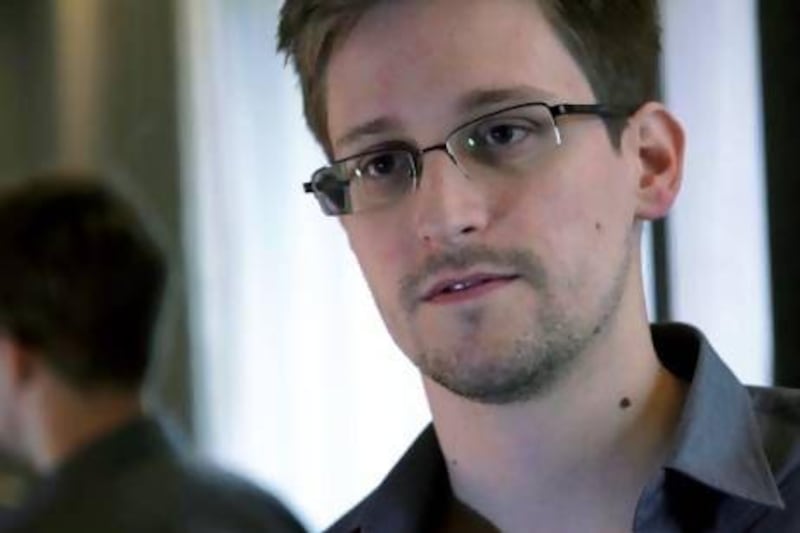New York // The former CIA computer specialist who exposed a vast US domestic and international surveillance programme was thought to be hiding in Hong Kong yesterday.
Edward Snowden, 29, checked out of a hotel room in the city yesterday afternoon and his current whereabouts are unknown.
He told the Guardian newspaper that he publicised details of the National Security Agency's surveillance so the public could "decide whether these programmes and policies are right or wrong".
Edward Snowden, 29, told the Guardian newspaper that he publicised details of the National Security Agency's surveillance so the public could "decide whether these programmes and policies are right or wrong".
Mr Snowden, a $200,000-a-year NSA private contractor in Hawaii, where he lived with his girlfriend, said he fled to Hong Kong on May 20 because "they have a spirited commitment to free speech and the right of political dissent".
He may have miscalculated. China has no extradition treaty with the US, but the semi-autonomous island territory of Hong Kong does, and handed over two fugitive Al Qaeda suspects in 2003.
The US department of justice has opened a criminal investigation into the leaks of details of the Prism surveillance system, but has not named Mr Snowden.
Hong Kong is "obliged to comply" with its responsibilities to Washington and extradite Mr Snowden, Regina Ip, a senior politician and the city's former top security official, said yesterday.
"It's actually in his best interest to leave Hong Kong," she said.
Beijing has the authority to block extraditions from Hong Kong if the case involves its national security or foreign affairs.
The case will be complicated for both Washington and Beijing after a weekend summit between the two presidents, Barack Obama and Xi Jingping, which was dominated by the issue of cyber-security and overshadowed by persistent US claims of illegal Chinese online espionage.
If Chinese authorities do acquiesce to any US demands on repatriation, the quid pro quo may be unpalatable for Washington. Several high-profile Chinese political dissidents have been given asylum in the US.
Mr Snowden could face decades in prison for releasing classified information if he is successfully extradited from Hong Kong, said Mark Zaid, a national security lawyer who represents whistleblowers.
Each document leaked could be considered a separate offence, attracting a 10 or 20-year penalty for each count, Mr Zaid said.
While there has been no statement from the White House on Mr Snowden, some members of Congress have begun to call for his extradition.
"If Edward Snowden did in fact leak the NSA data as he claims, the United States government must prosecute him to the fullest extent of the law and begin extradition proceedings at the earliest date," congressman Peter King, a New York Republican, said.
Mr Snowden told the Guardian he believed the government could try to charge him with treason under the Espionage Act. Mr Zaid said that would require proof that he had intent to betray the United States, and he had made it clear he acted to encourage debate.
The Justice Department has aggressively prosecuted suspected leakers of classified information - in greater numbers than at any time in US history - and the court martial of soldier Bradley Manning, who is accused providing a huge data dump to WikiLeaks, resumed yesterday.
Mr Snowden worked at an NSA facility in Hawaii as a relatively low-level computer expert for the defence contractor Booz Allen Hamilton, which has won billions of dollars' worth of US government contracts in cyber-intelligence over the past decade.
The company said he had been employed by them for the past three months, described the disclosure as "shocking" and pledged to cooperate with the investigation.
Mr Snowden said he first became disillusioned after he joined the military and tried out for the special forces. "Most of the people training us seemed pumped up about killing Arabs, not helping anyone," he said. After breaking his legs during his basic training, Mr Snowden was discharged in 2004.
He told the Guardian that he later worked for the CIA under diplomatic cover in Geneva before eventually working with top secret clearance for a number of private contractors with the NSA for three years. His said his resolve to publicise what he considered to be surveillance work that violated the US constitution hardened during these years, and the agency was "intent on making every conversation and every form of behaviour in the world known to them".
Mr Snowden's decision to go public as the man behind one of the most significant leaks in US history dramatically refocused attention on the Obama administration's expansion of the secret surveillance apparatus it inherited from the first post-9/11 presidency.
The exposure of the programmes, which collected data on all domestic phone calls made on at least one carrier as well as mined online data on foreigners and Americans communicating with foreigners directly from the largest tech companies, has renewed the debate on the balance between security and privacy.
"As a whistleblower myself, this is one of the most significant leakers in my lifetime and in US history," said Jesselyn Radack, a former justice department attorney who represents whistleblowers.
She said she hoped the case could become "a watershed moment that could change the war on whistleblowers and the broader war on information in our country".
Mr Snowden hopes the media spotlight stays focused on the NSA's programmes and not his own plight. "I don't want the story to be about me. I want it to be about what the US government is doing," he told the Guardian.
He acknowledged the risks of going public, such as being rendered by the CIA and taken back to the US, but said he wanted to "embolden others to step forward" by showing them that "they can win".
* Additional reporting by the Associated Press and Reuters






